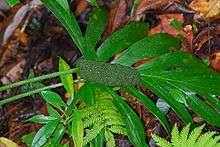Lasia
| Lasia | |
|---|---|
 | |
| L. spinosa | |
| Scientific classification | |
| Kingdom: | Plantae |
| (unranked): | Angiosperms |
| (unranked): | Monocots |
| Order: | Alismatales |
| Family: | Araceae |
| Subfamily: | Lasioideae |
| Genus: | Lasia Lour. |
| Synonyms[1] | |
|
Lasius Hassk. | |
Lasia is a genus of flowering plants in the Araceae family, native to Asia and New Guinea. The genus contains only two known species, Lasia spinosa and Lasia concinna.[1][2][3] Lasia was believed to be a monotypic genus until 1997 when a wild population of Lasia concinna was discovered in a farmer's paddy field in West Kalimantan, Indonesia. The farmer had been growing them for their edible young leaves. This species of Lasia had been known of previously only from a single specimen at the Bogor Botanic Gardens, formally described in 1920.[4] Prior to 1997, the specimen was believed to have been a hybrid between Lasia spinosa and Cyrtosperma merkusii.[5] The subsequent discovery by Hambali and Sizemore led to the realization that it was in fact a distinct species.[6][7]
- Lasia concinna Alderw. - West Kalimantan
- Lasia spinosa (L.) Thwaites - China (including Taiwan and Tibet), Indian Subcontinent, Indochina, Malaysia, Indonesia, New Guinea
Notes
- 1 2 Kew World Checklist of Selected Plant Families
- ↑ Govaerts, R. & Frodin, D.G. (2002). World Checklist and Bibliography of Araceae (and Acoraceae): 1-560. The Board of Trustees of the Royal Botanic Gardens, Kew
- ↑ Flora of China, Vol. 23 Page 16 刺芋属 ci yu shu, Lasia Loureiro, Fl. Cochinch. 1: 64, 81. 1790.
- ↑ Alderwerelt van Rosenburgh, Cornelis Rugier Willem Karel van. 1920. Bulletin du Jardin Botanique de Buitenzorg 1: 379
- ↑ Hay, A. (1990). Aroids of Papua New Guinea. Christensen Research Center
- ↑ Bown, Demi (2000). Aroids: Plants of the Arum Family. Timber Press. ISBN 0-88192-485-7.
- ↑ Hambali, G. G. and Sizemore, M. (1997). The rediscovery of Lasia concinna Alderw. (Araceae: Lasioideae) in West Kalimantan, Borneo. Aroideana 20: 37-39.